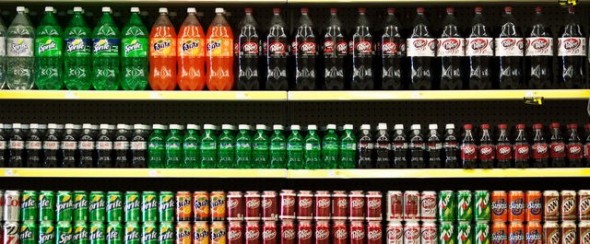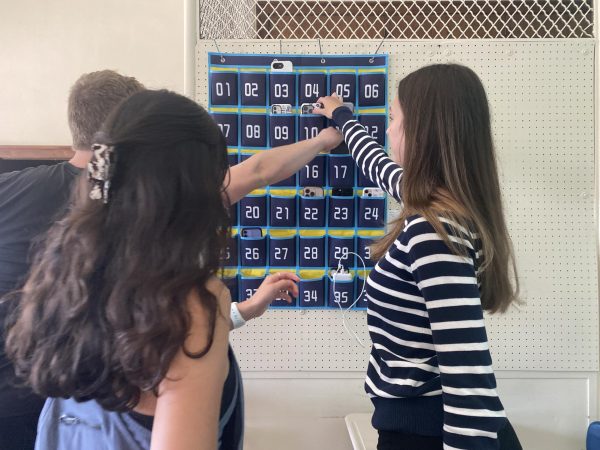Soda restriction laws stir up debate

By Corinne Meyers
For many teenagers soda is a part of everyday life; however, some states are trying to pass laws to decrease the amount of soda people consume.
Soda has many negative side effects including obesity, diabetes, and tooth decay. States such as California and New York are trying to implement laws that will get people to drink less soda.
Legislators in California are trying to enact a law that would require warning labels to go on all sodas that are over 75 calories per 12 ounces. In 2013, the New York mayor, Michael Bloomberg, tried to ban drinks larger than 16 oz. (more commonly know as the Big Gulp ban) in an attempt to get people to stop drinking as much soda; however, the law was deemed unconstitutional.
On Jan. 1 Samantha Maslona, Div. 473, was sitting in Potbelly with her friends and decided not to get a soda because she had been drinking more of it over the holidays and it had been making her feel sick.
“[The sick feeling] is when you realize that you’ve had too much sugar and your mouth feels all gross,” Maslona said.
After this day at Potbelly, Maslona and her friends decided that they would not drink anymore soda and so far it has stuck. After she stopped drinking soda she thought back to when she drank it more often. She remembers thinking it was weird putting chemicals into her body without knowing what they were.
“Every time I would drink soda I was thinking ‘Why does it look like this? What makes it light or dark?’ The fact that I didn’t know the answers really weirded me out,” she said.
Maslona thinks that everyone should be able to make the decision to drink soda themselves because almost everyone knows that it is not good for them.
“No one could possibly drink a ton of soda every day and be surprised if there are repercussions,” she said.
The long-term effects of soda are even worse than many people know. Some studies have found a correlation between high soda intake and decreased consumption of healthy drinks such as milk which is important because it contains calcium. The decreased consumption of drinks other than soda can even be worse than the common effects of drinking soda that labels are trying to warn consumers about. Increased soda intake can lead to malnourishment in extreme cases because of the low intake of important nutrients and minerals that are in other drinks.
Maslona believes that teens would not stop buying soda if there was a label on it. She thinks that if that were the case people would be swayed by the nutritional information already on the label.
“Honestly, if people want to get a lot of soda they will find a way,” she said.
Other students agree with her. Sanee Kassam, Div. 765, drinks soda almost every day and he believes that people will always find a way to get what is banned.
“People will ignore this [Big Gulp ban] and try to find loopholes in this ban which in the long term effect will only be hurtful,” he said.
Danny Shine, Div. 561, and Angela Inita, Div. 589, are both on Lacrosse teams at Lane and believe the same is true.
Shine does not drink any soda because he wants to keep healthy for his sport.
“Being an athlete, I try to avoid it since it’s not good for me,” he said. “Personally I find it disgusting how much sugar is in it.”
However, Inita has a different opinion. She loves to drink soda and says she can’t resist the taste even though she knows the effects it could have on her body. She even has a personal record of drinking a one and a half liter of Pepsi in 15 minutes.
Inita needed a bottle for a project in engineering. She had the bottle but also had the soda inside; this was a problem. She took the challenge given to herself and chugged the soda down so she could use it for the project.
“[My stomach] was unbearably painful afterwards,” Inita said. “I felt so sick but so accomplished.”
As an athlete she makes sure to balance out the soda with healthy foods and extra time running before her practices.
She does agree with Shine that there should be no banning of soda.
“It would rustle some feathers but nothing more,” Inita said. “Warning labels would be better than that.”
Not everyone agrees that warning labels would be the right thing. Starr Briscoe, Div. 557, doesn’t think that labels are the way to go.
“Obviously sugary stuff will make you get diabetes and tooth decay,” she said. “But warning labels? That’s unnecessary.”
She also disagrees with the banning of soda because she believes that Americans should be free to choose for themselves.
“People should have the choice to buy or eat what they want,” she said. “If people want to be unhealthy, let them.”
Lesley Bustos, Div. 550, drinks soda every day, but agrees with a ban. She thinks that if you are obese, have tooth decay, or have diabetes you should, by law, have soda restrictions.
“It [soda] should be banned from those who may have or already have gained the negative side effects,” she said.
Soda is an unhealthy drink that has bad side effects and many students believe action needs to be taken.
“I think people should just know,” Briscoe said. “Soda doesn’t cause obesity, people cause obesity.”
Your donations directly fund the Lane Tech student journalism program—covering essential costs like website hosting and technology not supported by our school or district. Your generosity empowers our student reporters to investigate, write, and publish impactful stories that matter to our school community.
This website is more than a publishing platform—it's an archive, a research tool, and a source of truth. Every dollar helps us preserve and grow this resource so future students can learn from and build on the work being done today.
Thank you for supporting the next generation of journalists at Lane Tech College Prep!

Cori Meyers is one of the online editors and one of the managing editors for The Warrior. She is a senior at Lane and is also captain of the majorettes....



